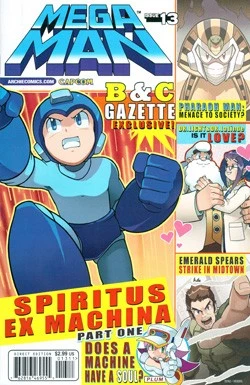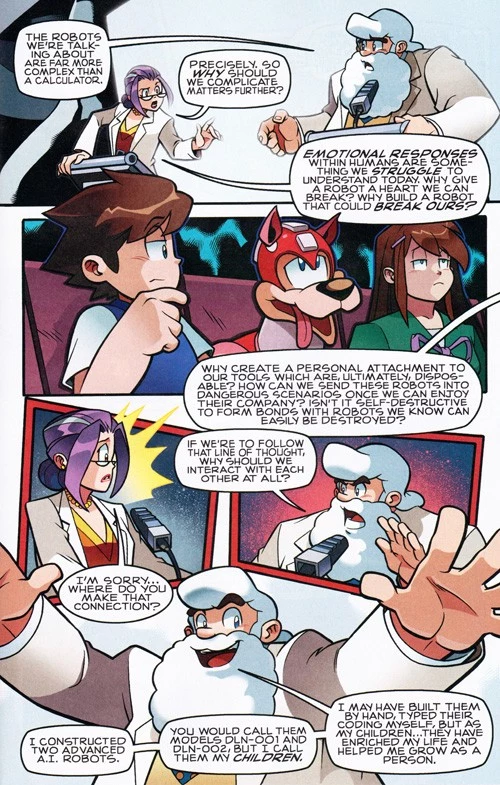
Why ‘Mega Man’ Is the Smartest Super-Hero Comic On the Stands

As strange as it might sound, one of the best super-hero comics on the stands today isn't put out by Marvel, DC, or any of the other usual suspects. In fact, it doesn't even star a character that originated in comics. It's a video game tie-in put out by Archie Comics, and as crazy as it seems, Mega Man has spent the last year showing pretty much every other book on the market the right way to do thrilling all-ages adventure.
Mostly because it's a book made for children that's not afraid to have a five-page debate about the morality of creating artificial life.  I wrote about Mega Man last year when the series was first starting up, and one of the things that really impressed me back then was how Ian Flynn and Patrick Spaziante used their story to bring in a pretty intense psychological drama about the effect that killing other robots would have on Mega Man's psyche. It was genuinely compelling and, considering that this was an adventure comic based on an NES game that came out in 1987, completely unexpected.
I wrote about Mega Man last year when the series was first starting up, and one of the things that really impressed me back then was how Ian Flynn and Patrick Spaziante used their story to bring in a pretty intense psychological drama about the effect that killing other robots would have on Mega Man's psyche. It was genuinely compelling and, considering that this was an adventure comic based on an NES game that came out in 1987, completely unexpected.
But the thing is, it never felt out of place. Flynn and Spaz were able to blend the serious drama in with the action and the comedy to create one of the most well-rounded books out there, but more importantly, they followed the one rule that makes an all-ages book great: They never talked down to the audience. And because they were willing to take a smarter approach to the subject of a robot blowing up other robots and stealing their special weapons so that he could go blow up even more robots, they set a tone for the series that's head and shoulders above the rest.
And this week's Mega Man #13, which kicks off the book's third story arc by Flynn, Jonathan Hill, Grant Martin, Matt Herns and the legendary John Workman, is a perfect example of how they're doing it. I mean, make no mistake, as much as I consider it to be an all-ages title, the target audience here is clearly skewing towards kids, to the point where each issue has a gallery of (pretty awesome) crayon drawings sent in by readers next to the letter column. But it's also a comic with a cover blurb asking "Does a machine have a soul?" that then goes on to debate that very question inside.
And as dour as that might sound, it's not. In fact, one of the things I love about the book is its willingness to embrace the... eccentricities of the source material in a way that's completely free of irony.

I love this aspect of what Flynn & Co. are doing here. Because really, even if you accept that someone could build a robot designed for dealing with high temperatures and designed him to look like a Zippo lighter, the fact that someone would build a robot designed for archaeology and then make him look like a cartoon mummy is completely insane. And yet, the creators don't feel any need to justify this at all. That's just how they roll in the year 20XX.
So the comedy, the silliness, the fun, it's all still there. And it's also worth noting that Pharaoh Man's presence points to another strong element of the book: He's an enemy that doesn't appear until the fourth Mega Man video game, and here he is in a comic story that takes place before they've even gotten to the events of Mega Man III. That might not seem like anything to shout about, but it shows how much they're devoting to building their characters.
Flynn and Hill could easily just rely on the fact that you recognize these characters from video games and let that recognition (or in the case of old timey Mega Man fans like me, nostalgia) do the work for them. But they don't. Flynn's scripts follow the plots and beats of the games, but since those plots tended to amount to "jump, shoot, and move to the right," he's used the breathing room that gives him to develop an entire cast with unique personalities and frustrations. And the book's better for it; when you start to sympathize with robots who wished they could override their programming and start electrocuting humans...

...that's a pretty good sign that the character work has done its job.
In this issue, that character work leads to the best conflict of the series so far. And the interesting thing is that it doesn't have anything to do with robots running around shooting at each other. It doesn't even have anything to do with Mega Man's arch-enemy Dr. Wily, who's off playing Indiana Jones on a different continent in his own side story.
It has to do with a debate over whether Mega Man should even exist at all.

The great thing about this sequence, aside from the fact that Flynn does a great job with the dialogue and Hill's deceptively expressive art, is that it's an actual debate. The audience isn't given a good guy to root for and a bad guy to hiss at. We obviously want Dr. Light to win because we've spent a year of comics getting to like the guy and also he looks like Santa Claus in a lab coat, but Dr. Lalinde's points are presented as every bit as valid.
As much as Dr. Light talks about how creating artificial intelligence gives robots the ability to perform increasingly complex tasks, and how his relationship with his creations is no different than a parent's with their children, Lalinde's counterpoints are equally thoughtful. She raises questions about whether it's morally right to create something with thoughts and feelings when its purpose is to be an expendable tool.
It builds off the themes that we've already seen in the series, about what it means to be human, and the toll that inflicting and suffering violence can take on a person, even when they're doing so in the name of a greater good, and whether you can justify making a sentient creature endure those things if there was a way to accomplish them without that anguish, and if it would be better to create soulless, unfeeling killing machines than soldiers that can think for themselves. And by building valid points on either side, Flynn's script has created an honest debate about what it means to be capable of both creating and taking life.
And again: This is happening in a video game tie-in comic for children published by Archie.
If you haven't been reading it, the first chapter of "Spirtus Ex Machina" is a great place to try it out, and the two paperbacks collecting #1-12 are worth every penny. Mega Man has blown past every expectation I've had for it and become the comic I look forward to reading the most every month. It's fun, it's smart, it's accessible, and it's layered so well that I'm getting as great an experience out of reading it at 29 as I would've at six. It's gone beyond being "just a video game comic" or "just a kid's comic" and become a comic that's genuinely great, and the creators show no sign of slowing down as they enter their second year.
It's up there with Atomic Robo, another great comic about robots, as the book I want to send to every other publisher in the industry with a note attached saying "This is how you do it right."
More From ComicsAlliance



![Take A Trip To The Relatively Murder-Free Classic Riverdale In ‘Best Of Archie 2016′ [Preview]](http://townsquare.media/site/622/files/2017/03/BestOfArchie01.jpg?w=980&q=75)

![The Blossom Twins And Pete Woods Wreak Havoc On Riverdale In ‘Archie’ #18 [Interview]](http://townsquare.media/site/622/files/2017/03/Archie00.jpg?w=980&q=75)



